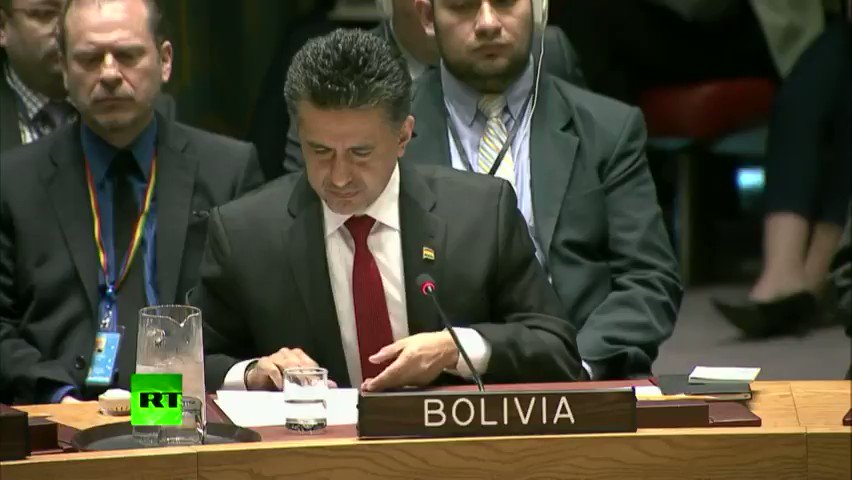Washington’s ‘unilateralism’ in Syria undermines UN – head of Iraqi WMD probe to RT
Washington should have waited for the findings of an impartial probe and international authorization before unilaterally striking Syria on the pretext of chemical weapons use, according to Hans Blix who led the UN commission searching for Iraqi WMDs in 2003.
“It would have been desirable to have an impartial investigation of the attack first, as they were discussing in the Security Council,” Blix told RT.
The former head of the International Atomic Energy Agency gained the world media's attention after his team of experts from the United Nations Monitoring, Verification and Inspection Commission failed to find weapons of mass destruction in Iraq.
Possible possession of chemical weapons was used as a pretext by the US in 2003 to invade Iraq. Over the years, that false pretense has cost the lives of up to one million Iraqis according to some estimates.
On Friday, the US carried out missile strikes on the Shayrat Airfield near Homs in response to an alleged chemical attack on a rebel-held town in Idlib province which Washington pinned on the Assad government. Damascus firmly denied the accusations, saying that its Air Force attacked an arms depot where chemical weapons might have been stockpiled by Islamic State (IS, formerly ISIS/ISIL) and Al-Nusra Front militants.
Blix stressed that Washington's airstrikes ran contrary to the common practice of international law which requires the approval of the UN before carrying out any form of aggression against another state.
“The UN Charter prohibits the threat or use of force against the territorial integrity of other states. And the US is not at war with Syria. So they should not attack them,” Blix said.
“In the time when big power ignores the Security Council and ignores the Charter, they are also undermining the organization, and that is also regrettable,” he added.
On Thursday, before Washington unleashed 59 Tomahawk missiles on Syria, Russia tried to convince the UN Security Council to send in a team of experts into Syria to investigate the latest chemical attack reports. Instead of waiting for the result of the impartial UN probe, the US went on to strike Syrian government positions, a move condemned by Moscow and Damascus.
‘Russia doesn’t intend to get into armed standoff with US in #Syria’ – Head of Defense, Security Committee on.rt.com/88fj
“The US would have needed an authorization by the Security Council. And that was missing. This is unilateralism. A unilateralism of the same kind that many in the US wanted in [2013] with the attack outside Damascus,” Blix added.
Blix advised that in order to avoid further bloodshed in Syria, Moscow and Washington should focus on diplomacy, just like in 2013, when Russia convinced Syrian President Bashar Assad to surrender his chemical weapons stockpile to the UN. In 2013 the Syrian government surrendered its entire chemical weapons arsenal, except for the stockpiles located in the inaccessible rebel-and terrorist-controlled areas, which was confirmed by the UN-affiliated Organization for the Prohibition of Chemical Weapons.
“They removed enormous quantities of chemical weapons in the midst of a civil war,” Blix said, expressing doubts that Damascus surrendered all of its unconventional arsenal but still praising the “terrific operation that the US and Russia together have managed to get going.”
At the same time, the Swede warned that it will be harder to return to constructive negotiations because of the “harsh words from Washington” and Moscow’s reaction to the American rhetoric. The sad alternative to further negotiations might be that eventually, the US gets “deeper” involved in the ongoing conflict.
“The war will then go on simply,” Blix warned.
'US said it had proof of WMDs, 1mn people died' - #Bolivia UN slams Syria strike (FULL VIDEO) on.rt.com/88a3
Despite the widespread condemnation to the US strikes, the White House on Monday said new missile strikes on Syria is possible in case of chemical attacks on civilians.
“The sight of people being gassed and blown away by barrel bombs ensures that if we see this kind of action again, we hold open the possibility of future action,” White House spokesman Sean Spicer said at a news conference.
Russia has meanwhile called for an expert investigation into the chemical attack, saying, it is “the only way to receive and present to the whole international community any objective evidence on the alleged presence of poisonous substances.”





0 Comments:
Post a Comment
Subscribe to Post Comments [Atom]
<< Home